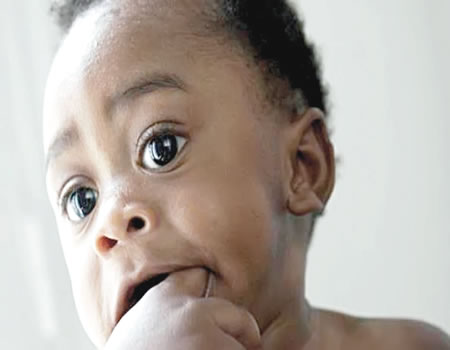This mother would not be placated; her screams rang through the hospital as she wailed uncontrollably for the loss of her baby. As a first time mother with little or no experience, Gladys (not her real name) sought advice from elderly women in her neighbourhood when her baby boy started running high fever and stooling. The other so-called experienced mothers laughed at her naivety and the fact that she was being too much of a mother hen. The boy is only teething, they reassured her over and over again. However, his situation grew worse. He grew so weak from the diarrhea and could barely breathe. It was at that instance that she rushed her baby to the hospital. Unfortunately, the toddler took his final breaths at the emergency unit of the hospital he was taken to.
Several mothers are of the misconception that teething in babies is accompanied by a number of symptoms including fever and diarrhea. Sadly, this assumption like in the unfortunate case of Gladys could end a toddler’s life.
According to experts, teething, the eruption of primary teeth in babies, usually begins around 6 months of age. However, it is normal for teething to start at any time between 3 months and 12 months of age. By the time a child is about 3 years old, he or she will have all 20 primary teeth.
The lower front teeth usually come in first. Upper front teeth usually come in 1 to 2 months after the lower front teeth.
For the average mom, virtually every symptom a baby comes up with within this period is associated with teething but experts have said that the assumption that teething causes such symptoms is wrong. “Teething does not cause diarrhea,” says Dr Atinuke Uwajeh of the Paediatric Partners Hospital, Victoria Island, Lagos. The consultant paediatrician explained that “the only reason a child develops diarrhea while teething is because the gum is usually very irritable and the baby tends to put anything and everything in its mouth.” These dirt and other germs that has been ingested by the baby is what causes the diarrhea due to contamination and resulting infection. Not the teething itself, Uwajeh emphasised.
Uwajeh added that fever in babies should not be considered as a symptom of teething. “It is no longer generally accepted that teething causes fever! In the real medical sense, symptoms of teething include pain, irritability, drooling, poor feeding, disturbed sleep and redness over the gum,” she said.
Recently, Dr. Opeodu Olanrewaju Ige of the Department of Periodontology and Community Dentistry, University College Hospital, Ibadan and his colleague, Popoola Olubukola, carried out a study to assess the beliefs of nursing mothers concerning symptoms that are associated with teething among children and to identify those that would seek medical treatments in case of their children having such symptoms during teething.
In his study, that was published in the Nigerian Medical Journal as the paper titled “Teething myths among nursing mothers in a Nigerian community,” two hundred and ninety nursing mothers whose children had erupted at least a tooth were interviewed in the immunisation clinics of the University College Hospital and Adeoyo Maternity Teaching Hospital, both in Ibadan, on their beliefs and practice concerning teething in children.
Based on the findings of the study, One hundred and eighty-eight of the mothers assessed associated symptoms such as fever, cough, catarrh and diarrhoea with eruption of teeth in their children.
Dr Ige therefore concluded that mothers in the study attributed several symptoms to teething, which could be detrimental to the survival of their children as the symptom could have been due to other causes. The study also recommended the need for public enlightenment to create awareness on the possible effect of presumptuous belief that childhood diseases are due to teething process. On ways to help soothe the pains of a teething child, Uwajeh advised that pain relievers like paracetamol, cool liquids and chewy toys that can be refrigerated, should be provided.
Dos and Don’ts of teething
Do massage sore little gums with your clean finger or a cool cloth.
Do give your teething infant a cool rubber teething ring. Ensure it is kept clean.
Do start cleaning your child’s gums and new teeth in order to protect their teeth from cavities. Before your baby’s first tooth becomes visible in the mouth, you should wipe the mouth every day with a soft, moist washcloth. As soon as teeth become visible in the mouth, brush the teeth with a small, soft bristle toothbrush that contains a pea-sized smear of fluoride-containing toothpaste.
If your baby is a heavy drooler, the constant contact with saliva may cause the skin around the chin and mouth to become irritated. Gently wipe your baby’s mouth and chin periodically throughout the day to help prevent chapped skin and rashes.
Don’t self-prescribe antibiotics. Dr Olubunmi Bankole of the Department of Child Oral Health, University of Ibadan, Ibadan, pointed out that “among the local populace from the lower social class, tetracycline popularly called “capsule” is given to babies to cure “teething diarrhoea.” Tetracycline is known to be taken up by calcifying tissues which can lead to grayish discolouration of teeth. Also, the implication of the indiscriminate use of antibiotics among infants is that the child is at risk of developing adverse reactions such as hypersensitivity to the antibiotic and there is the potential for building of resistant bacterial strains.”
Don’t administer local concoctions. “Many of these are not scientifically tested with undetermined doses and content; it may be of danger to the health of the child. Documentations have revealed that the use of concoctions have sometimes led to some fatalities in children,” Dr Bankole said.
Don’t put your baby to bed with a feeding bottle in his/her mouth (unless it’s filled with water). The sugars in formula and breast milk will sit on his teeth all night and can lead to baby-bottle tooth decay.






